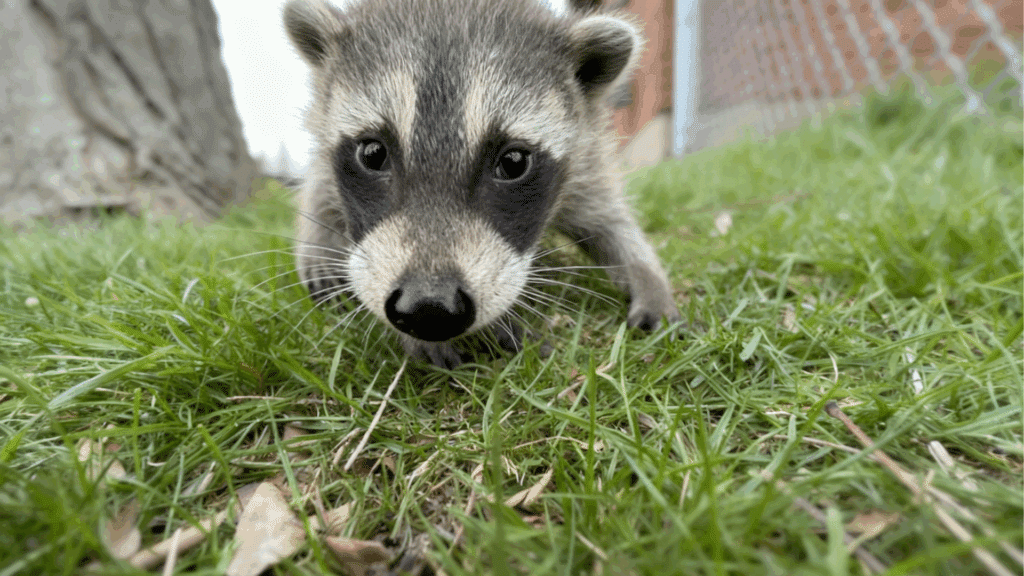Raccoons may look cute, but they can cause big problems in a garden. Many people deal with this issue each year, especially in warmer months.
These animals are smart and often come back if the garden is easy to reach.
It’s not always simple to stop them, but it can be done with the right steps. There are safe, kind ways to keep raccoons away without harming them.
By using a few tools and making small changes, anyone can protect their space. It all starts with understanding what raccoons like and how to deter them.
Why Raccoons are a Problem for Gardens?
Raccoons cause more trouble than many gardeners expect. They do not just take a few bites of fruit; they often leave damage all over the garden.
They dig into the soil, flatten small plants, and tear up garden beds in search of insects or roots.
They might rip through netting or chew soft plastic parts. Raccoons also leave behind waste that can carry germs harmful to people and pets.
Since they usually come at night, most damage is noticed in the morning, by which time it’s too late.
When a raccoon finds food once, it may come back again and again. That makes them a long-term problem if not handled early and properly.
Common Reasons Raccoons Enter Gardens
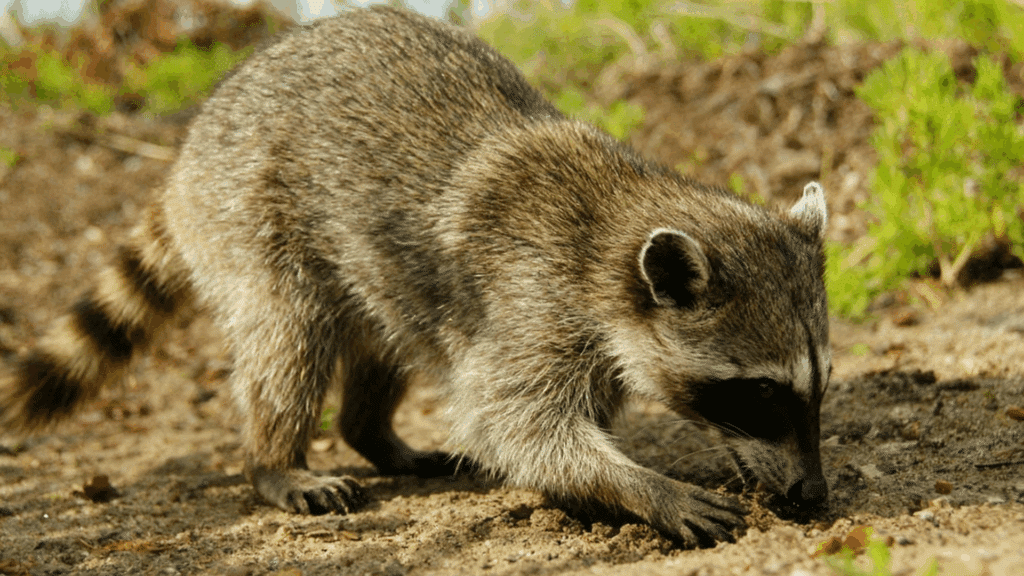
Before learning how to keep raccoons away, it’s important to understand why they visit gardens in the first place:
- Food: Raccoons love fruits, vegetables, and leftover pet food. If your garden offers easy meals, they will come.
- Water: Bird baths, ponds, or open pet bowls are also big attractions.
- Shelter: Overgrown bushes, woodpiles, and sheds can become cozy hiding places.
- Easy Access: If your garden is not fenced or protected, raccoons see it as an open door.
Signs of Raccoons in the Garden
It’s not always easy to catch raccoons in action since they come out at night. But they often leave behind clues. Below are the most common signs that raccoons have visited your garden:
| Sign | What It Means |
|---|---|
| Dug-up soil or small holes | Raccoons dig for bugs or roots in garden beds and lawns. |
| Half-eaten fruits or vegetables | They nibble on ripe crops and often leave the rest behind. |
| Knocked-over pots or bins | Raccoons are strong and can tip over containers while searching for food. |
| Torn garden netting or fencing | They may chew or claw through barriers to get to crops. |
| Small paw prints in dirt or mud | Raccoons leave hand-like prints, often near wet soil or garden beds. |
| Droppings in the garden | Their waste can resemble dog poop and may be left near feeding spots. |
| Trash or compost is scattered | Messy piles near bins or open compost often point to a raccoon visit. |
How to Keep Raccoons Out of the Garden: Best Ways
Raccoons are clever and persistent, but there are safe and simple ways to keep them out of your garden. These tips are easy to follow and won’t cause harm to the animals or your plants:
1. Secure the Trash
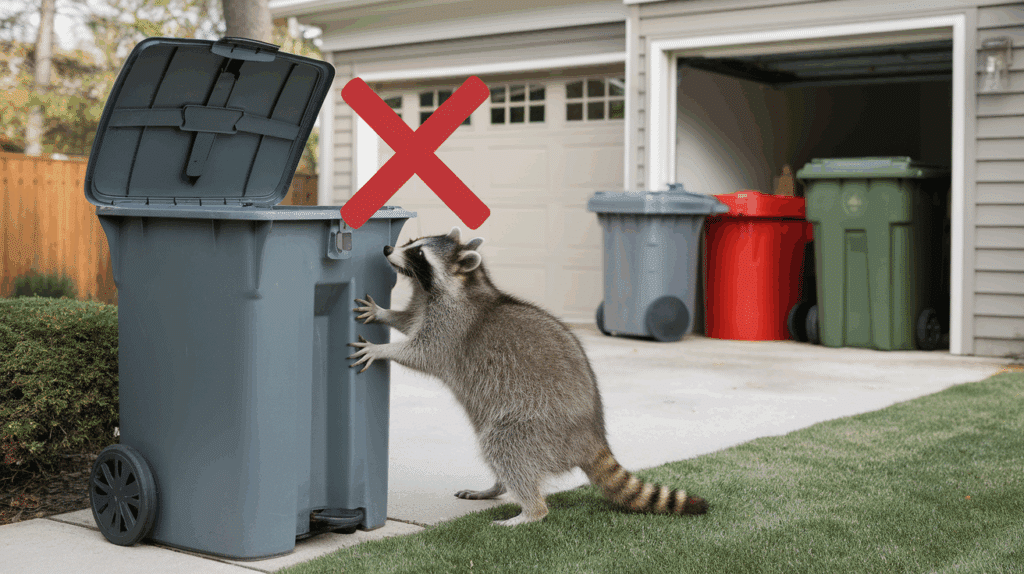
Raccoons are scavengers. If your garbage can is easy to open, they will come back again and again.
What to do:
- Use cans with locking lids.
- Keep bins in a closed shed or garage.
- Wash out containers so they don’t smell like food.
- Avoid putting meat or strong-smelling scraps in compost.
2. Fence the Garden Well
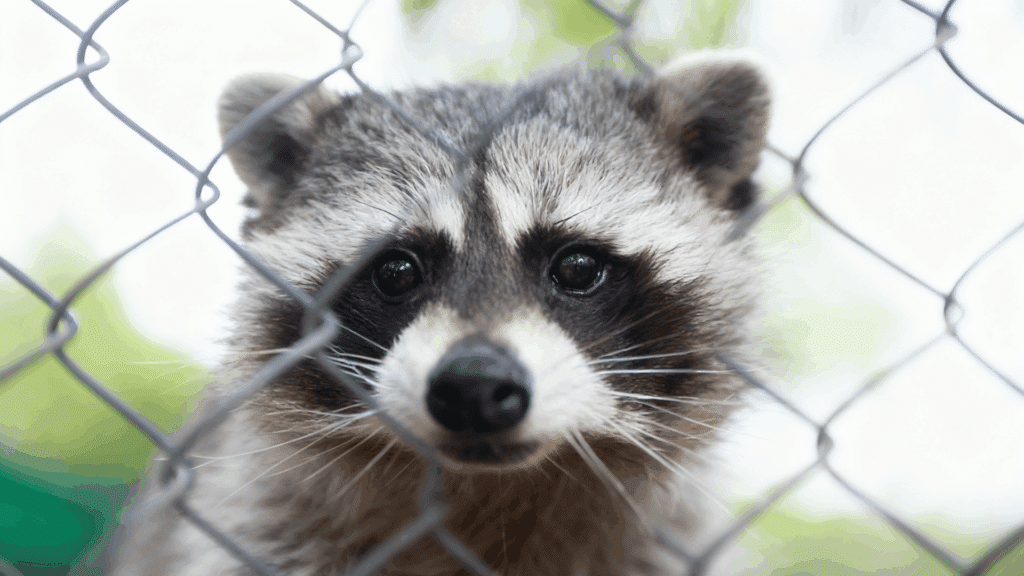
Fencing works, but only if it’s done right. Raccoons are good climbers, so regular fences may not stop them.
Best fencing tips:
- Use wire mesh fencing at least 3 to 4 feet tall.
- Bend the top of the fence outward to make climbing harder.
- Bury the bottom of the fence 6–12 inches into the ground to stop digging.
- Add an electric wire near the top if you’re in a raccoon-heavy area (check local rules first).
3. Remove Food and Water Sources
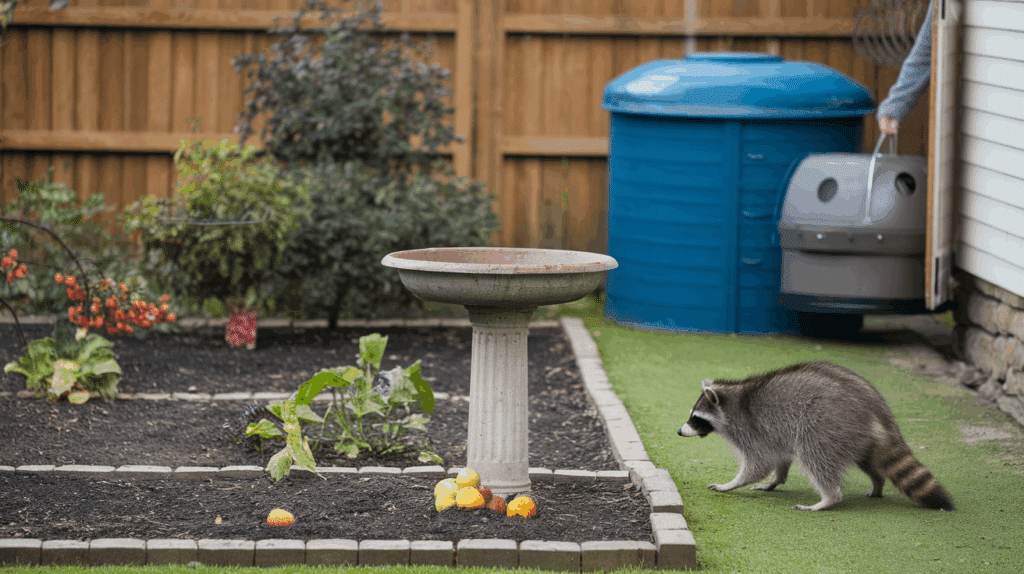
No food, no raccoons. It’s that simple.
Remove or protect:
- Fallen fruits or vegetables
- Open compost bins
- Pet food bowls (especially at night)
- Bird feeders (or use ones that close at night)
- Standing water, like bird baths and fountains
4. Use Motion-Activated Lights and Sprinklers
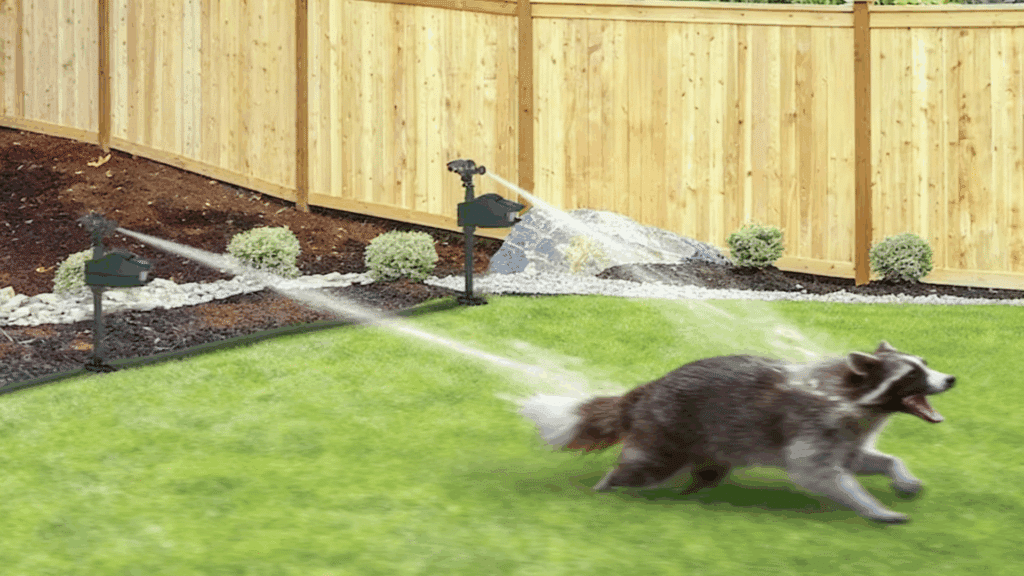
Raccoons are mostly active at night. They don’t like sudden lights or water sprays.
Products to try:
- Motion-sensor sprinklers: These spray water when movement is detected.
- Motion lights: Bright light can scare raccoons away.
These tools are safe, don’t harm the animals, and can protect large areas at once.
5. Make Noise to Scare Them Off
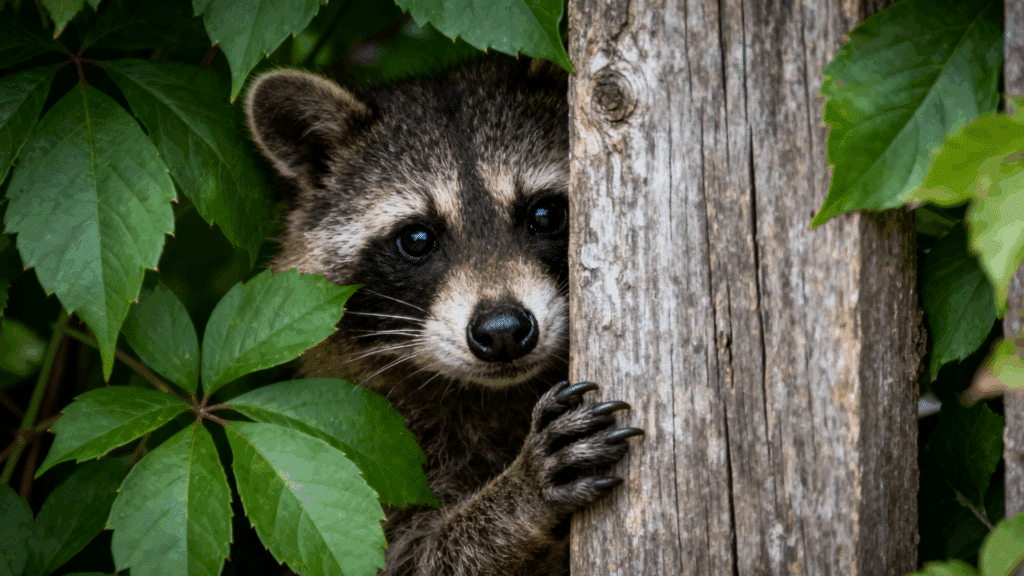
Raccoons avoid noisy places. A few sound tricks can make them think your yard isn’t safe.
Noise-making ideas:
- Hang wind chimes in trees or along fences.
- Place a small radio near the garden on a timer at night.
- Tie together empty cans or tin pans to clink in the breeze.
6. Use Reflective Objects
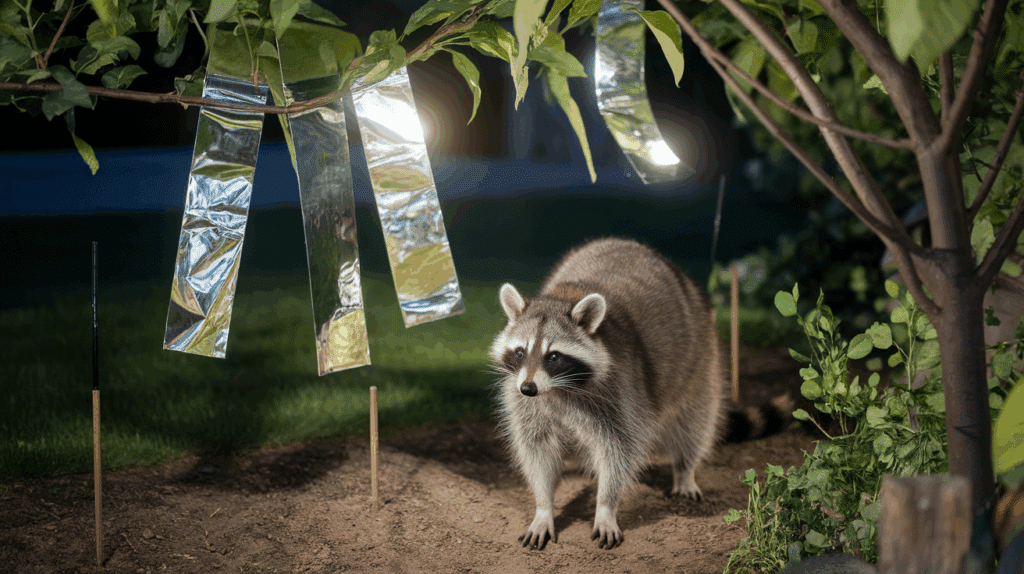
Light reflections can confuse and scare raccoons, especially at night.
Easy items to hang:
- Strips of aluminum foil
- Reflective tape (often sold for bird control)
- Old CDs or DVDs tied to strings
- Shiny pie pans or lids
Hang these near garden beds, fruit trees, or entry points.
7. Try Natural Smell-Based Repellents
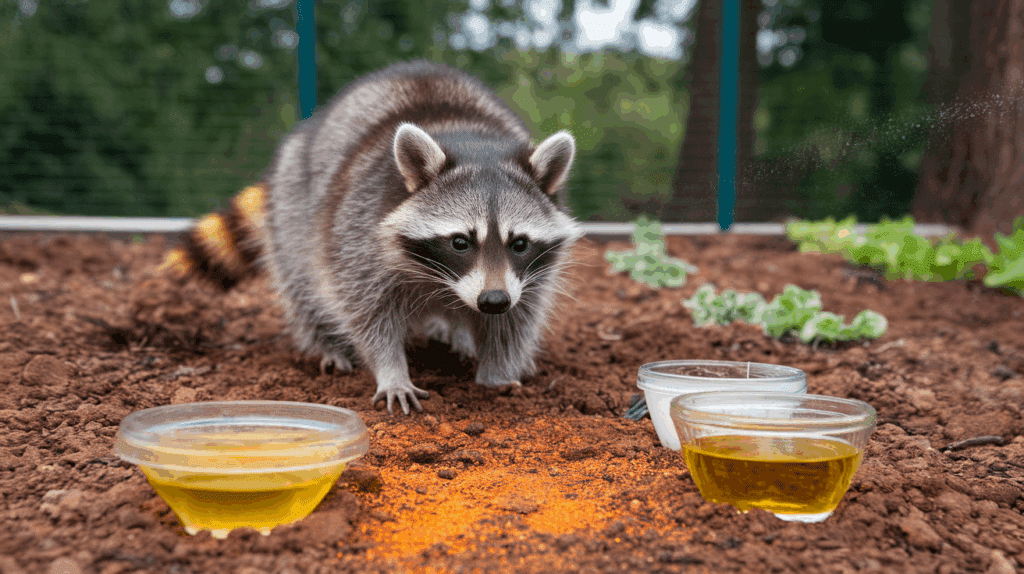
Raccoons have a strong sense of smell. Certain smells will make them think twice.
Safe scent repellents include:
- Vinegar: Soak cloths in white vinegar and leave them near garden edges.
- Ammonia: Put a small bowl near problem spots (keep it covered with holes so it doesn’t spill).
- Garlic or onion spray: Mix crushed garlic or onion with water and spray around the garden.
Note: These may need to be reapplied every few days or after rain.
How to Deter Raccoons with a DIY Solution
If you prefer home remedies, there is an easy do-it-yourself method that can help keep raccoons away. This simple spray uses strong smells raccoons don’t like.
You’ll need:
- 1 tablespoon of hot sauce or cayenne pepper
- 1 tablespoon of dish soap
- 1 quart of water
Steps:
- Mix all ingredients in a spray bottle.
- Spray the solution around garden beds, fences, and garbage can lids.
- Avoid spraying directly on fruits or veggies.
- Reapply after rain or every few days.
When to Call a Professional
If you’ve tried several methods and raccoons still return, it may be time to call a licensed wildlife control expert.
This is especially important if raccoons are nesting under your home, shed, or deck. It’s also a good idea if they are not scared off by lights, sounds, or smells.
Finding baby raccoons and not knowing how to help is another sign to get expert support.
Professionals can safely remove the animals and ensure they don’t return. They can also check for entry points and offer long-term solutions to protect your garden and home
Mistakes to Avoid with Raccoons
Some actions may seem like a good idea, but can be dangerous or illegal.
- Don’t feed raccoons: This makes the problem worse and keeps them coming back.
- Don’t trap and move them: In many places, it’s against the law and not safe.
- Don’t use poison: It’s harmful to other animals, pets, and the environment.
- Don’t try to touch them: Raccoons can bite or carry diseases like rabies.
Conclusion
Gardens should be a peaceful place to grow food, enjoy nature, and relax. But when raccoons visit, that peace can quickly turn into frustration.
With small changes, you can send a clear message: this space is not for them. The key is to stay patient and consistent.
It may take a few tries, but simple habits often make the biggest difference. Every garden is different, so find what works best for yours.
Want more easy tips to protect your garden? Bookmark this or share it with a friend who’s dealing with raccoons, too.

